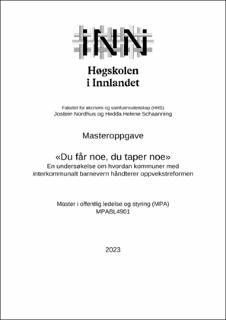| dc.contributor.advisor | | |
| dc.contributor.author | Hedda Helene Schaanning | |
| dc.contributor.author | Jostein Nordhus | |
| dc.date.accessioned | 2023-12-22T17:10:30Z | |
| dc.date.available | 2023-12-22T17:10:30Z | |
| dc.date.issued | 2023 | |
| dc.identifier | no.inn:inspera:176343704:99641491 | |
| dc.identifier.uri | https://hdl.handle.net/11250/3108832 | |
| dc.description.abstract | Denne undersøkelsen retter seg mot hvordan interkommunale barnevernssamarbeid håndterer oppvekstreformen. Oppvekstreformen er den mest omfattende som har berørt kommunene siden samhandlingsreformen i 2012 og involverer hele oppvekstfeltet internt i kommunene. Undersøkelsen setter søkelys på hvordan organisering av samarbeid mellom kommunene kan ha betydning for håndteringen og implementering av reformen. Undersøkelsen har problemstillingen «Hvordan håndterer kommuner oppvekstreformen når barneverntjenesten er organisert i et interkommunalt samarbeid?».
Undersøkelsen bygger på organisasjonsteori, forebyggingsteori, samt redegjørelser og kunnskapsstatus om oppvekstreformen og interkommunale samarbeid. Vi har gjennomført en kvalitativ undersøkelse der vi har gjort et strategisk utvalg slik at informanter fra ulike kommuner er representert; både små kommuner, mellomstore kommuner, vertskommuner og samarbeidskommuner. Kommunedirektører og barnevernledere har vært informanter.
Funnene i undersøkelsen viser at uformelle samarbeidsrelasjoner synes å være en viktig faktor hvorav graden av tillit og god relasjon mellom kommunene synes å være en suksessfaktor for å samarbeide godt om oppvekstreformen. Samarbeid over tid er en nøkkel og en fast samarbeidskonstellasjon mellom kommunene kan bidra til kontinuitet og tillit. Det kan i tillegg synes som at prosjektorganisering av oppvekstreformen på tvers av samarbeidskommunene avlaster barneverntjenesten. Prosjektorganisering gir også hver enkelt kommune hjelp til å implementere endringer som følge av reformen på en annen måte enn de kommunene som ikke har prosjektorganisert arbeidet med reformen. Felles metodikk har også vist seg å være en suksessfaktor for forståelsen av reformen ute i kommunene. Ulike fagnettverk på tvers av kommunene kan være en faktor som kan bidra til å redusere hvor fragmentert et interkommunalt samarbeid oppleves av de ulike kommunene. En stor utfordring for kommunene er knappe økonomiske ressurser hvorav informantene nevner at blant annet statlig rettighetsstyring er årsak, samt ressurstilgang i form av menneskelige ressurser. Kommunene er imidlertid samstemte om at intensjonen i oppvekstreformen er viktig, og at hvorvidt kommunene lykkes med reformen kan ha stor betydning for kommunenes ressursbruk på oppvekstfeltet i fremtiden slik at den samlede ressursbruken i kommunene kan omprioriteres til å møte den kommende «eldrebølgen». | |
| dc.description.abstract | This survey focuses on how intermunicipal child welfare cooperation handles the upbringing reform. The upbringing reform is the most significant reform to affect municipalities since the healthcare cooperation reform in 2012, and it impacts the entire field of child development within municipalities. The survey sheds light on how the organization of cooperation between municipalities can influence the management and implementation of the reform. The research question is “How do municipalities handle the upbringing reform when the child welfare services are organized in an intermunicipal cooperation?".
The survey is based on organizational theory, prevention theory, as well as descriptions and the current state of knowledge regarding intermunicipal cooperation and the upbringing reform. We have conducted a qualitative survey in which we have made a strategic selection so that informants from various municipalities are represented, including small municipalities, medium-sized municipalities, host municipalities, and collaborating municipalities. The informants consist of municipal directors and child welfare leaders.
The findings in the survey indicate that informal collaborative relationships appear to be an important factor, with the level of trust and a good relationship between municipalities being a success factor for effective cooperation on the upbringing reform. Long-term collaboration is key, and a stable collaboration structure between municipalities can contribute to continuity and trust. Additionally, it seems that project-based organization of the upbringing reform across collaborating municipalities eases the burden on child welfare services. Project-based organization also assists each municipality in implementing changes resulting from the reform differently from municipalities that have not organized the reform work in this manner. An established method is also a factor which can have an impact on the understanding of the reform. Various professional networks across collaborating municipalities can also be an important factor that can influence how fragmented an intermunicipal cooperation is perceived by the different municipalities. A major challenge for municipalities is limited economic resources, which informants, mentions is due to state-directed regulation. Resource availability in terms of human resources is also mentioned as a challenge. However, municipalities agree that the intention of the upbringing reform is important, and that the success of the reform can have a significant impact on the future allocation of the total of resources within municipalities to address the upcoming «aging population». | |
| dc.language | nob | |
| dc.publisher | Inland Norway University | |
| dc.title | "Du får noe, du taper noe" - en undersøkelse om hvordan kommuner med interkommunalt barnevern håndterer oppvekstreformen | |
| dc.type | Master thesis | |
